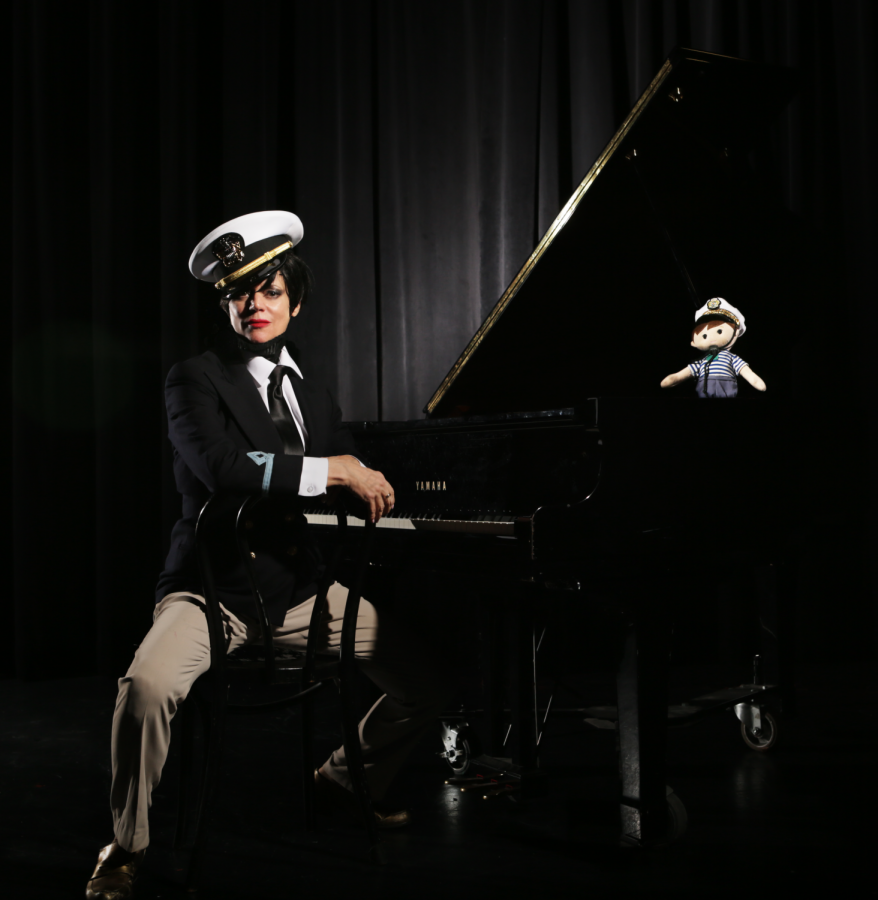A Forgotten Queer History in ‘Speed Queen’
Phoebe Legere in “Speed Queen” at Dixon Place.
March 27, 2018
“Imitation is the sincerest form of flattery that mediocrity can pay to greatness,” a character intones in Phoebe Legere’s new theater piece “Speed Queen,” which ran at Dixon Place, an off-off-Broadway theater from March 9 to March 24. The quote, from Oscar Wilde, spoken in almost an aside to the audience, is both winkingly meta and unintentionally telling.
“Speed Queen” is a strange creature, a one-woman show that includes music, comedy and film. Written and performed by Legere and directed by Lissa Moira, the piece is an imagined retelling of Marion Barbara “Joe” Carstairs’ life. Carstairs, born in 1900, was a world champion speedboat racer, heir to a vast oil fortune, cross-dresser and lover to countless female celebrities.
Performed mostly in monologue or song, the piece charts Joe’s life, from her time as a teenage ambulance driver during World War I — during which she met her first girlfriend, Dolly Wilde, niece of Oscar — to settling in Paris and eventually to a private island in the Bahamas.
Legere’s sonorous and wide-ranging voice fills the room during the original songs, and it lends itself well to the larger-than-life characters she inhabits in the show. As Joe, she embodies an excited, gee-whiz attitude. As Marlene Dietrich, the famous movie actor and one of Joe’s lovers, she exudes a slinky, sly sexual confidence with a killer German accent.
There are some truly laugh-out-loud moments — in particular, an interjection by a beaver hand puppet — but in general, the show operates at all times at a low level of (not always endearing) absurdity.
Joe Carstairs’ life was deeply queer, and “Speed Queen’s” campy sensibility reflects that. Legere’s performances as Joe and four of her lovers are exaggerated, hysterical and consummately performative, emphasized by her red lipstick, dragged-out eyeshadow and profusion of wigs. When Legere plays other characters, the stand-in for Joe is a sex doll in costume. Other parts of the show feature projections of pre-filmed segments of Legere intercut with softcore porn.
In her famed essay “Notes on ‘Camp,’” Susan Sontag makes a distinction between “naive and deliberate camp,” asserting that deliberate camp, or camp with intention, is less satisfying. Here lies the core problem with “Speed Queen.” While the show is definitely campy, its deliberate application of camp falls flat.
For a professional like Legere, with decades of experience writing and performing, the show was strangely plagued by production issues. She was constantly adjusting her wig, and her mic picked up her breath for much of the show. Her costume changes, conducted behind a screen off to the side as she continued speaking, felt curiously amateurish.
Furthermore, the show’s attempts to grasp at contemporary political themes falls flat. Identified as a lesbian during her lifetime, Carstairs today may have identified as a transgender man. Regardless, she was definitely ostracized for her queer identity.
“Speed Queen” attempts to draw a link between Carstairs’ life openly defying gender norms and today’s ongoing struggle for queer and transgender rights. After winning an important race, Joe waves an enormous rainbow flag, encouraging the audience to wave their own small flags distributed before the show. Compared to the rest of the show, in all its unapologetic weirdness and largely unsuccessful experimentation, this bland attempt at coming together only alienates.
Email Alex Cullina at [email protected].




























































































































































